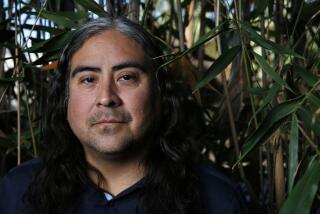SAXOPHONIST HUNTER: SUCCESSFUL SOLOIST
Though she has for brief periods played other reed instruments, such as the bassoon and the clarinet, Laura Hunter has been primarily a saxophonist--indeed, a saxophone soloist--since the sixth grade.
“I never wanted to do anything else,” she admits. “Of course, when I was in college (the University of Michigan at Ann Arbor), I had, like everybody else, a doom-and-gloom attitude about making it as a soloist. So I prepared myself to teach.”
Then, having formed a duo with her pianist-colleague, Brian Connelly, while still at the university, Hunter went out into the world of music--teaching, doing free-lance playing and accepting solo and duo engagements.
“What happened was that we were more successful than we had expected,” she says. “In this past season, I’ve even had to turn down work.”
At 28, Hunter, who appears at a Pro Musicis-sponsored recital at UCLA on Saturday night, continues to succeed. Formerly under the sponsorship of Concert Artists Guild, Hunter for the last two seasons has been a Pro Musicis artist--giving recitals in large urban centers as well as community-service performances in the same centers.
And last month she became an Affiliate Artist, one who spends short periods in towns around the country meeting people and giving “informances”--solo performances in informal settings like shopping centers, retirement homes and factories.
This week, Hunter, with Connelly, will give a recital in Schoenberg Hall Auditorium, appear at a center for runaway children and play at Terminal Island Prison. She says the formal concerts have become much easier since her exposure to the community-service sites.
“After you’ve played at a prison or at a hospice--places where your audience is made up of people who don’t usually go to concerts, and where you may have very little in common with them on the surface--the concert-hall event becomes a snap,” Hunter says.
“In a prison appearance, the performer has to distill the musical experience for the listener, who may have no exposure to ‘classical’ music at all, and whose present situation may be particularly intense.
“As a performer, you find yourself asking basic questions like, ‘What do I have to offer these people?’ and ‘What is the essence of this piece?’ These are questions that never arise in other situations, situations where the audience comes to the artist. Here, the artist is going out to the people, where they are. It’s a whole other thing.”
Those who attend Hunter’s Saturday-night concert need not fear, she says.
“Even though we do a lot of new music, it’s all very accessible. And, at the beginning, I play Baroque music on the soprano sax, which to me sounds exactly like the Baroque oboe.
“Besides, music by Ibert and Ravel is nothing to be afraid of. And ‘Saxema’ by Rudy Wiedoeft, that’s just ragtime.”
William Bolcom’s “Lilith,” on the other hand--one of three new works commissioned by Hunter (on a grant from the National Endowment for the Arts) and recently given premieres by her--is a “major work--18 minutes long and substantial.”
Lilith, Hunter explains, is a figure from Talmudic tradition, Adam’s mythical first mate--the one not created from his rib, and therefore the threatening one; in fact, in Arabic folklore, a demon, a child stealer and the seducer of priests.
“It’s a wonderful, five-movement piece that uses a lot of so-called extended techniques. We’ve now played it in Oregon and in New York.”
More to Read
The biggest entertainment stories
Get our big stories about Hollywood, film, television, music, arts, culture and more right in your inbox as soon as they publish.
You may occasionally receive promotional content from the Los Angeles Times.










